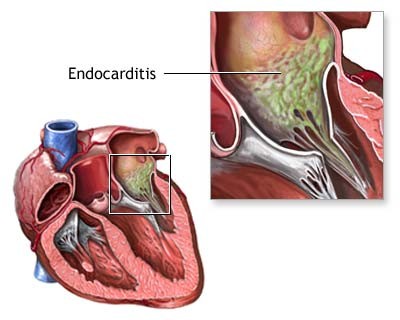|
Endocarditis - an inflammation of the inside lining
of the heart chambers and heart valves (endocardium),
can involve the heart muscle, heart valves, or lining
of the heart.

Most people who develop endocarditis have underlying
valvular heart disease. Injection drug use, recent dental
surgery, permanent central venous access lines, prior
valve surgery, and weakened valves are risk factors for
developing endocarditis. Bacterial infection is the
most common source of endocarditis. However, it can
also be caused by fungi.
In some cases, no causative organism can be identified.
Symptoms:
- fatigue, weakness, fever, chills
- night sweats, may be severe
- weight loss, muscle aches and pains
- heart murmur, shortness of breath with activity
- red painless skin spots, located on the palms and
soles (called Janeway lesions)
- red, painful nodes in the pads of the fingers and
toes (called Osler's nodes)
- joint pain, abnormal urine color
Hospitalization is often
required initially to treat administer intravenous antibiotics.
Long-term antibiotic therapy is required to eradicate
the bacteria from the heart chambers and vegetations
on the valves.
If heart failure develops as a result of damaged heart valves, or if the infection
is breaking off in little pieces resulting in a series of
strokes, surgery to replace the affected heart valve may be indicated. |